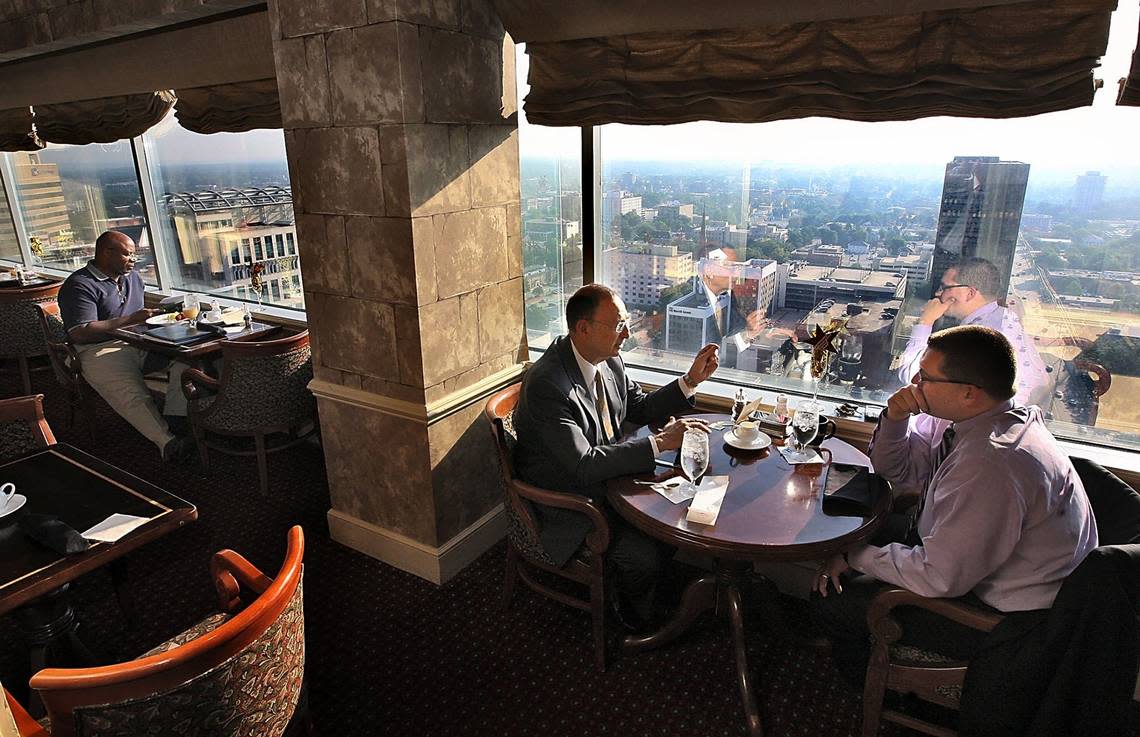Members hope to save 35-year-old Capital City Club, among city’s first racially inclusive

In the mid-1980s, a Black IBM executive wanted to become a member of the Spring Valley Country Club in northeastern Richland County, but he was turned away because of his race, according to interviews and news reports from that time.
Columbia’s business community responded by launching the Capital City Club, which was open to members of any race, gender or religion from the outset. It was one of the city’s first expressly inclusive clubs and is credited with signaling to other clubs that it was time to shed the racist practices of the past.
Now, the club atop the 25-story Truist tower downtown is at risk of closing after 35 years of operations.
“The Capital City Club represents diversity in an industry that has a history of segregation,” said J.T. McLawhorn, president of the Columbia Urban League and current club board member.
McLawhorn said Invited Clubs, which currently operates the Capital City Club, has indicated it plans to end its management. In an email sent to club members Monday, Jan. 29, members were notified of plans for the club to close by Feb. 20, citing post-COVID-19 challenges.
But club members have been working behind the scenes for months looking for ways to save the historic organization. Tom Persons, a founding member of the club and former board chair, said he and other club leaders have a handful of options that might save it.
The club was owned by the board in its first two years of operation. Persons said it’s unlikely the current board members alone would be able to handle the cost, but several local investors have expressed interest in helping to keep it open.
“We’ve got 700+ members who do not want to see this club close,” Persons said.
A culture shift
“I have a profound sense of disappointment” at the club’s potential closure, said Luther Battiste, who served on Columbia City Council for 15 years and who was the first Black chairman of the Capital City Club board.
“The other clubs that were in existence then would not have become more inclusive if the Capital City Club had not taken the bold step it did,” Battiste said. “It forced (other clubs) to look at themselves differently and to do the right thing.”
A few other clubs in Columbia had a few Black members. A 1990 article in The State notes that the Summit Club had three prominent Black Columbians as members as early as 1987, but the Capital City Club was likely the first club to be founded on a mission of inclusivity.
Members of the Legislature and Columbia business leaders have used the club as a nice place to take clients and out-of-towners. The club has even held events to teach high school students etiquette. Some of the club’s staff have worked there for decades — at least three have been there since it opened. Persons said around 50 employees would lose their jobs if the club closed.
When the club opened, it was still largely white and male, but it was considered among the most diverse clubs in Columbia at the time, if not the most diverse, according to news reports from 1988. The club also welcomed women and Jewish members, which was uncommon for many social clubs at the time.
“The results are astounding in the sense that it’s quite a wholesome mixture of the community,” I.S. Leevy Johnson said in 1988 when the club first opened. Johnson is a former South Carolina state representative and owner of Leevy’s Funeral Home. “It reinforces your appreciation for the community. You can see the growth, the diversity and how vibrant the city is.”
Former State Sen. Isadore Lourie, who was Jewish, was also one of the club’s founding board members, as were multiple women.
“When it was started I think it filled a real need,” said Bob Coble, former Columbia mayor and current Capital City Club member.
Capital City Club opened with nearly 900 members, and Black members and women made up about 7.5% of the club, according to past news reports.
The club was important beyond its ability to reckon with racist policies across the city. It was also just practical for business leaders and others to have a welcoming place to conduct business while showing off Columbia to would-be investors, members said.
“It didn’t start as a social club, it started as a business club,” McLawhorn said.
The club’s future remains somewhat uncertain.
Capital City Club’s general manager, David Colucci, did not immediately respond to a request for comment.
But Powers is optimistic that somehow the club’s loyal members will find a way to keep it open.

